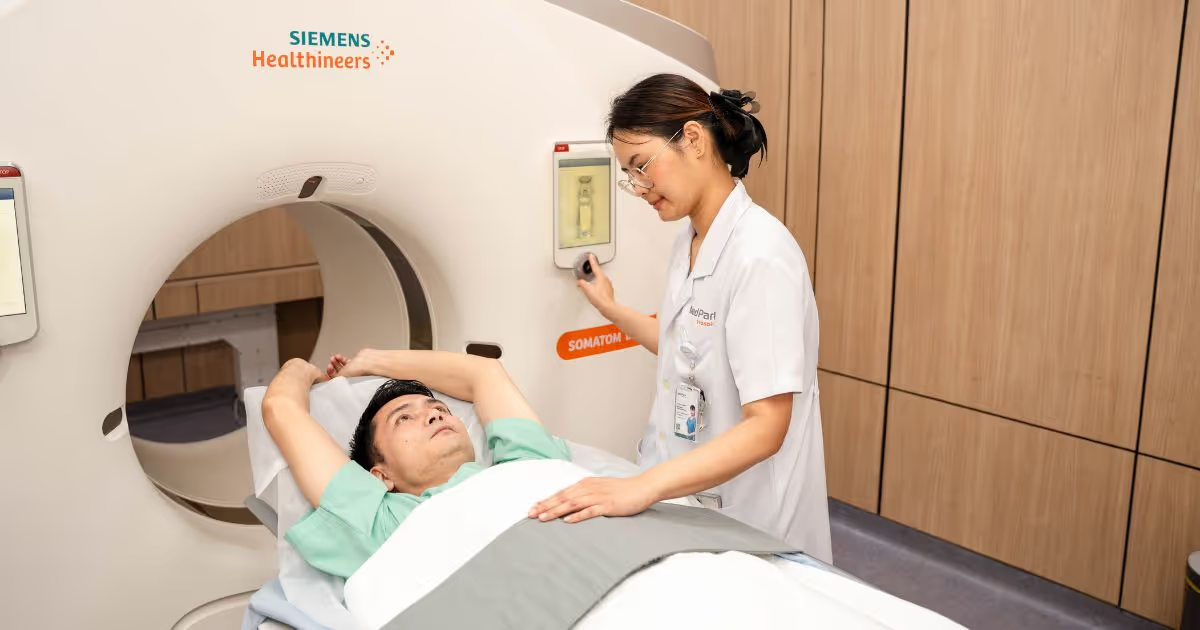การตรวจคัดกรองมะเร็งปอดด้วย Low-dose CT scan
Low-dose CT scan (LDCT Scan) เป็นการตรวจเอกซเรย์คอมพิวเตอร์ด้วยปริมาณรังสีต่ำ ต่างจากการตรวจเอกซเรย์คอมพิวเตอร์แบบมาตรฐานทั่วไปตรงที่มีการใช้รังสีในปริมาณที่น้อยกว่ามากในการถ่ายภาพเอกซ์เรย์คอมพิวเตอร์ไอออนไนซ์ ผู้เข้ารับการรักษาจึงไม่ต้องกังวลว่าจะได้รับรังสีมากเกินไป เครื่องตรวจเอกซเรย์คอมพิวเตอร์อันทันสมัยอย่างเช่นที่ใช้อยู่ที่โรงพยาบาลเมดพาร์คจะใช้ปริมาณรังสีต่ำมาก โดยไม่ลดทอนความสามารถในการวินิจฉัย และเป็นวิธีตรวจคัดกรองที่ไม่เจ็บ ไม่มีแผลผ่าตัด และใช้เวลาตรวจเพียงไม่กี่นาทีก็เสร็จ
LDCT Scan ถูกใช้ในการคัดกรองมะเร็งปอด โดยจะถ่ายภาพภายในทรวงอกของผู้รับบริการขณะที่กำลังนอนอยู่ ภาพถ่ายจะถูกนำมาประมวลและแสดงภาพของอวัยวะภายในอย่างละเอียด เนื่องจากภาพมีคุณภาพสูงจึงสามารถตรวจพบความผิดปกติเพียงเล็กน้อยหรือมะเร็งปอดระยะเริ่มต้นได้ โดยจากการศึกษาพบว่าสามารถช่วยลดอัตราการเสียชีวิตจากมะเร็งปอดได้ถึง 20 % โดยเฉพาะอย่างยิ่งในผู้ที่มีความเสี่ยงสูง
การตรวจคัดกรองมะเร็งปอดด้วย Low-dose CT Scan เหมาะกับใครบ้าง
- ผู้ที่สูบบุหรี่เป็นประจำเท่ากับหรือมากกว่า 20 ซองต่อปี (จำนวนซองที่สูบต่อวัน คูณ จำนวนปีที่สูบ เท่ากับหรือมากกว่า 20 )และมีอายุระหว่าง 50-80 ปี
- ผู้ที่สูดควันบุหรี่มือสองบ่อย ๆ
- ผู้ที่มีอายุระหว่าง 50-80 ปี เคยมีประวัติสูบบุหรี่มากกว่า 20 ซองต่อปี และเลิกสูบบุหรี่มาน้อยกว่า 15 ปี
- ผู้ที่มีประวัติคนในครอบครัวสายตรงเป็นมะเร็งปอด
- ผู้ที่สัมผัสกับสารเคมีหรือก๊าซกัมมันตภาพเรดอน (Radon)
- ผู้ที่อาศัยเป็นเวลานานในสถานที่ ที่มี ฝุ่น PM 2.5 และมลพิษทางอากาศสูง
นอกจากนี้ ควรมีสุขภาพแข็งแรงพอที่จะรักษาถ้าพบมะเร็งปอดโดยการผ่าตัด ฉายแสง และ/หรือ ให้เคมีบำบัด
ขั้นตอนการตรวจด้วย LDCT Scan
ก่อนเข้ารับการตรวจคัดกรอง Low-Dose CT Scan
ผู้เข้ารับการรักษาไม่จําเป็นต้องเตรียมตัวอะไรเป็นพิเศษ อย่างไรก็ตามไม่ควรสวมใส่วัตถุที่เป็นโลหะ เช่น ต่างหู แหวนแต่งงาน ในวันที่ทําหัตถการ ในกรณีที่ตั้งครรภ์หรือคิดว่าอาจจะตั้งครรภ์ ให้แจ้งนักรังสีวิทยาทันที
ในการตรวจคัดกรองมะเร็งปอดไม่จำเป็นต้องทำการฉีดสารทึบรังสี
ระหว่างการตรวจคัดกรองมะเร็งปอดด้วย Low-Dose CT Scan
ผู้เข้ารับการตรวจจะนอนหงายบนเตียงที่เคลื่อนที่ได้ ในการตรวจปอดนักรังสีวิทยาอาจขอให้ยกมือขึ้นเหนือศีรษะ หายใจเข้าและกลั้นหายใจ เตียงจะเคลื่อนเข้าไปยังเครื่องสแกนขณะที่ลําแสงเอกซเรย์ถูกฉายและเคลื่อนเป็นเกลียวไปรอบ ๆ ตัวผู้เข้ารับการรักษา การตรวจคัดกรองใช้เวลา 2-3 นาที ภาพที่ได้ถูกรวมเข้าด้วยกันเพื่อสร้างภาพ 3 มิติ ซึ่งรังสีแพทย์จะแปลผลว่ามีความผิดปกติใด ๆ หรือไม่
หลังการตรวจคัดกรองมะเร็งปอดด้วย Low-Dose CT Scan
นักรังสีวิทยาจะส่งผลไปยังแพทย์ซึ่งจะอธิบายผลที่ได้ให้กับผู้เข้ารับการรักษา
- Positive คือผลบวก หมายถึงตรวจพบความผิดปกติหรือก้อนเนื้อ แพทย์อาจให้ทำการตรวจเพิ่มเติมเพื่อวางแผนการรักษาที่เหมาะสม
- Negative คือผลลบ หมายถึงไม่พบความผิดปกติ แพทย์อาจแนะนําให้ทําการตรวจคัดกรองเป็นประจำ ทั้งนี้ขึ้นอยู่กับประวัติความเสี่ยงและอาการของผู้ป่วย
- Indeterminate คือผลไม่แน่ชัด หมายความว่าผลที่ได้ไม่เพียงพอที่จะแปลผลได้ อาจจำเป็นต้องทําการตรวจอีกครั้งในภายหลัง
การตรวจชนิดนี้สามารถตรวจพบมะเร็งในผู้ที่ป่วยเป็นมะเร็งบางชนิดที่โตเร็วได้ แต่อาจตรวจไม่พบมะเร็งประเภทที่เป็นฝ้าจาง (Ground-glass nodule)








